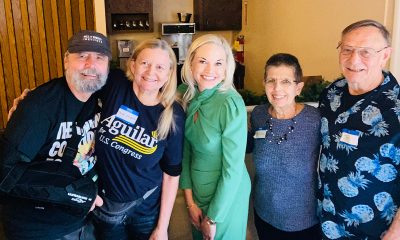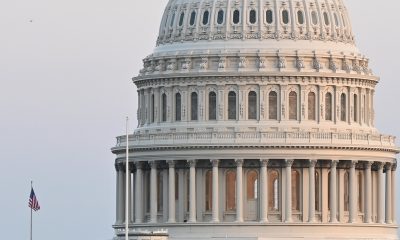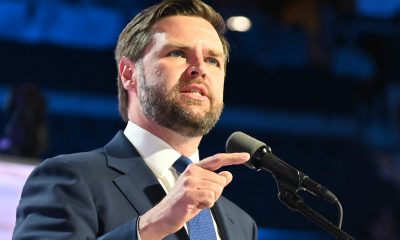Opinions
When the fascists came to Wadsworth, Ohio
‘Bombarded with the most hateful things’

Matthew Asente wasn’t sure what to expect when he arrived at Memorial Park in Wadsworth, Ohio. His wife first heard about the gathering on Facebook. A charity Drag Queen Storytime, organized by local Aaron Reed, whose proceeds would go to victims of the Club Q massacre in Colorado Springs. Recently approved by Wadsworth City Hall, the event’s location was moved from Wadsworth Brewing Co. due to violent threats. Nonetheless, Matthew thought it was important to attend alongside his son, because he wanted “to try and make sure our kids are being raised with the right values.” Matthew knew there’d be counter-protesters, predicting a smattering of “10-20 people,” mostly “locals from our town.” But this image was shattered when Matthew was confronted by an attendee, who warned him not to bring his son to the park. The stranger gave one reason: “there are literal Nazis down there.”
Asente’s guide wasn’t exaggerating. The images that would eventually arise from Wadsworth were shocking. Hundreds were attending the event, with right-wing cells having a considerable presence, including a coalition of far-right groups, ranging from the Proud Boys to Patriot Front and White Lives Matter. Most notable among them were the “Blood Tribe,” Neo-Nazis clad in black and red, who chanted “Sieg Heil,” and shouted racial slurs. The situation quickly descended into violence, as members of the far-right coterie clashed with the “Parasol Patrol,” a LGBTQ group used to defend attendees at events like this one. Two would eventually be jailed because of an altercation, with three unrelated medical emergencies, and three pepper spraying incidents, adding to the chaos. Pasha Ripley, who co-founded Parasol Patrol, recalled the counter-protesters “following us while we escorted kids to their cars.” Asente remembered how, as he and his son entered the pavilion where the storytime was held, they were “bombarded with the most hateful things.” They were “chanting about the final solution,” which created “a sense of tension throughout the entire day.”
After the events of March 11, the counter-protesters tried to distance themselves from their Neo-Nazi compatriots. One of the counter-protest’s primary leaders was Kristopher J. Anderson. Formerly a candidate for the Ohio statehouse, he lost to Democratic incumbent Tavia Gulonski, and has since re-branded as a grassroots activist. Anderson amplified the protest on social media, writing, “all hands on deck this weekend,” and “arrive early if you can,” on March 8, four days before the story hour. “If you care about children, it is your duty to show up,” Anderson Tweeted on March 9.
Repeatedly, Anderson has referred to the presence of Nazis and white supremacists as an unwelcome surprise. “No normal person wants to see Actual Nazi’s in Medina County or on this earth in 2023 or ever,” he wrote on Facebook after the event, later replying to an outraged commenter in another post that “Lumping in normal anti-groomer protesters with crazy people, white supremists, and Nazi’s,” is “unacceptable.” Anderson echoed this sentiment to the media. “We weren’t all on one side,” Anderson is quoted as saying by the Columbus Dispatch. Despite publicly lambasting the Nazi attendees, protest organizers shared a different view on Telegram. Messages from a private Telegram channel obtained by the Washington Blade show counter-protesters saw the Nazis as a nuisance, but a useful one, which could be used to intimidate their enemies as anti-LGBTQ policies are institutionalized.
“Just let the Nazis handle the pedos while we try to pass legislation,” wrote one user. Speaking about White Lives Matter, a self-identified Proud Boy noted “using those guys as part of the push for legislation,” can be “just as effective,” as demonizing the drag events themselves. Though the same user admonished Blood Tribe as “cringe,” they applauded them for having “stressed out and demoralized PP (Parasol Patrol).” Yet another poster wrote, “when life gives you lemons, make lemonade,” telling their fellow users to “have some fun with the Nazis showing up.”
Likewise, cross pollination between the 18+ Get Rid of US Telegram Channel and the message board of Project 171 — populated by members of the White Lives Matter chapter, and avowed Nazis — is frequently shown. “I’m one of the lead admins for WLM (White Lives Matter),” noted one user on Project 171’s public chat. Another user shared an image of a blonde woman holding an assault weapon dressed in a Ku Klux Klan robe. Regardless, the Project 171 channel’s administrator promoted his group on 18+. “Don’t forget to join the Project 171 chat,” the administrator wrote. Although organizers tried to spread misinformation about the Nazis’s origin, the Project 171 administrator was more honest. “Aaron didn’t have the Nazis come. They got invited through WLM.” Kristopher Anderson didn’t respond to a request for comment.
Unity among extremist sects against the queer community was an outcome of the Wadworth rally noted by Ford Fischer, a freelance documentarian, made famous by his coverage of Jan. 6 and the Unite the Right Rally in Charlottesville. No matter the minor ideological differences of factions like The Proud Boys or Patriot Front, on March 11, they were “all on the same side of this issue.” Only 36 hours away in Columbus, Ohio, a collection of hate groups led by the Proud Boys rallied against a drag story hour organized by Red Oak Community Schools, holding a victory rally after the event was canceled. According to Fischer, the “presence of a common enemy has been more effective than anything else in recent history.” Relating Wadsworth to his experiences in Charlottesville, Fischer diagnosed Unite the Right a failure, and the “common cause of protesting Confederate statues,” insufficient to prevent far-right infighting. Unlike Wadsworth, where the far right showcased a united front. “This event, that happened Saturday, fulfills the goal of the people at Charlottesville,” Fischer said.
Similarly, the topic of drag queen story hours has gone from a fringe issue on the right discussed by the likes of Alex Jones to a prominent talking point. Anti-drag bills have been introduced in 14 states since the passage of Tennessee’s law prohibiting drag performances in public, or where children may be present. Unsurprisingly, violent threats against drag performers have also increased, with GLAAD documenting 141 incidents of anti-LGBTQ threats targeting drag events. Aaron Reed, who conceived what would become the story hour in Memorial Park, believes conservative pundits are complicit in the violent actions and rhetoric wrought by hate groups. “Fox News is basically doing this,” Reed said, describing the alt-right as merely “following their lead.” Matthew Asente shared Reed’s sentiment, criticizing Republican politicians for “talking about outlawing these people.”
Aaron Reed’s memories of March 11 mainly concerned what happened inside the pavilion, rather than outside. Reed praised his team, and Parasol Patrol for trying to do “everything we could to block the kids from the hate,” and supportive locals, their children “laughing, singing, dancing,” as storyteller River Rose read and sang. Specifically, Reed named the father of a “ten-year-old local trans girl,” who said to him after the show it was “the first time he saw her smile in two years,” since beginning her transition.
Weeks have passed since the incident at Memorial Park, and Matthew Asente is still shaken. He has a “close trans friend,” with whom he plays Dungeons and Dragons. Asante admitted “I’d be lying if I said I understood it wholly at first,” but experiencing the hatred directed at the queer community on March 11 has given him a new perspective. For the first time, Asante recognized that the protesters at Memorial Park wanted to “eradicate,” the LGBTQ community, and called the vitriol directed at the attendees “terrifying.” However, Asante made clear what he went through was nothing compared to LGBTQ people who must withstand it daily, saying “I felt that for an hour.” Aaron Reed views March 11 as a warning, and should serve to “wake up the good people,” that many people in this country are “walking around in fear every day.” No matter what lines in the sand anti-LGBTQ activists attempt to draw, Matthew Asente felt the choice was far more binary. “You’re either with the Nazis, or against them.”
Zurie Pope is a University of Cincinnati student and freelance writer.
Opinions
Supreme Court decision on opt outs for LGBTQ books in classrooms will likely accelerate censorship
Mahmoud v. Taylor ruling sets dangerous precedent

With its ruling Friday requiring public schools to allow parents to opt their children out of lessons with content they object to — in this case, picture books featuring LGBTQ+ characters or themes — the Supreme Court has opened up a new frontier for accelerating book-banning and censorship.
The legal case, Mahmoud v. Taylor, was brought by a group of elementary school parents in Montgomery County, Md., who objected to nine books with LGBTQ+ characters and themes. The books included stories about a girl whose uncle marries his partner, a child bullied because of his pink shoes, and a puppy that gets lost at a Pride parade. The parents, citing religious objections, sued the school district, arguing that they must be given the right to opt their children out of classroom lessons including such books. Though the district had originally offered this option, it reversed course when the policy proved unworkable.
In its opinion the court overruled the decisions of the lower courts and sided with the parents, ruling that books depicting a same-sex wedding as a happy occasion or treating a gay or transgender child as any other child were “designed to present … certain contrary values and beliefs as things to be rejected.” The court held that exposing children to lessons including these books was coercive, and undermined the parents’ religious beliefs in violation of the free exercise clause of the First Amendment.
This decision is the latest case in recent years to use religious freedom arguments to justify decisions that infringe on other fundamental rights. The court has used the Free Exercise Clause of the First Amendment to permit companies to deny their employees insurance coverage for birth control, allow state-contracted Catholic adoption agencies to refuse to work with same-sex couples, and permit other businesses to discriminate against customers on the basis of their sexual orientation.
Here, the court used the Free Exercise Clause to erode bedrock principles of the Free Speech Clause at a moment when free expression is in peril. Since 2021, PEN America has documented 16,000 instances of book bans nationwide. In addition, its tracking shows 62 state laws restricting teaching and learning on subjects from race and racism to LGBTQ+ rights and gender — censorship not seen since the Red Scare of the 1950s.
Forcing school districts to provide “opt outs” will likely accelerate book challenges and provide book banners with another tool to chill speech. School districts looking to avoid logistical burdens and controversy will simply remove these books, enacting de facto book bans that deny children the right to read. The court’s ruling, carefully couched in the language of religious freedom, did not even consider countervailing and fundamental free speech rights. And it will make even more vulnerable one of the main targets of those who have campaigned for book bans: LGBTQ+ stories.
When understood in this wider context, it is clear that this case is about more than religious liberty — it is also about ideological orthodoxy. Many of the opt-out requests in Montgomery County were not religious in nature. When the reversal of the opt-out policy was first announced, many parents voiced concerns that any references to sexual orientation and gender identity were age-inappropriate.
The decision could allow parents to suppress all kinds of ideas they might find objectionable. In her dissent, Justice Sotomayor cites examples of objections parents could have to books depicting patriotism, interfaith marriage, immodest dress, or women’s rights generally, including the achievements of women working outside the home. If parents can demand a right to opt their children out of any topic to which they hold religious objections, what is to stop them from challenging books featuring gender equality, single mothers, or even a cheeseburger, which someone could theoretically oppose for not being kosher? This case throws the door open to such possibilities.
But the decision will have an immediate and negative impact on the millions of LGBTQ+ students and teachers, and students being raised in families with same-sex parents. This decision stigmatizes LGBTQ+ stories, children, and families, undermines free expression and the right to read, and impairs the mission of our schools to prepare children to live in a diverse and pluralistic society.
Literature is a powerful tool for building empathy and understanding for everyone, and for ensuring that the rising generation is adequately prepared to thrive in a pluralistic society. When children don’t see themselves in books they are left to feel ostracized. When other children see only people like them they lose out on the opportunity to understand the world we live in and the people around them.
Advocates should not give up but instead take a page from the authors who have written books they wished they could have read when they were young — by uplifting their stories. Despite this devastating decision, we cannot allow their voices to be silenced. Rather, we should commit to upholding the right to read diverse literature.
Elly Brinkley is a staff attorney with PEN America.
Opinions
Pragmatic presidents invest in America
We need targeted, accountable investment in workforce stability

America may soon elect a president who identifies as LGBTQ. This possibility is no longer far-fetched, nor should it be alarming. What matters far more than who the president is, is whom the president serves.
In America, we care who the president loves because we want to know whether they love the people they represent. Not just the powerful or the visible, but those struggling to contribute more fully. The farmer in Iowa. The single mother in Ohio. The veteran in Houston who sleeps in his truck.
The moral test of any president is whether they recognize that a nation cannot call itself strong when millions of its people are locked out of participating in the economy. This is not sentiment. It is strategy.
We are heading toward a century of global competition where population, productivity, and workforce strength will decide which nations lead. The United States cannot afford to ignore the foundational truth that economic health begins with human stability. Without a well-fed, well-housed, well-prepared workforce, the American economy simply cannot compete.
Today, millions of Americans remain outside the labor force. According to the Bureau of Labor Statistics, roughly six million working-age Americans are not working or actively looking for work. Another 36.5 million live below the poverty line. Many of them lack the basic conditions required to contribute to our modern economy: shelter, nutrition, healthcare, or safety.
The result is predictable. A smaller workforce. Greater dependencies. Stagnant productivity. In 2024, the Congressional Budget Office projected a long-term decline in labor force participation unless structural barriers are addressed. This is not only an economic issue. It is a national security issue.
China and India are investing heavily in their own labor capacity. Meanwhile, we risk squandering ours. This is the backdrop against which the next president, whoever they are, must lead.
The role of government is not to provide individual comfort or cradle-to-grave care; that responsibility rightly belongs to families, communities, and civil society. Its role is to maintain the conditions necessary for every willing individual to contribute productively and invest with confidence. This means access to a safe home. It means access to basic nutrition. It means access to the building blocks of a productive life. Securing for our work forces what the Apostle Paul called diatrophas and skepasmata; or food and a place to sleep. These are not luxuries or favors. They are investments that yield growth in national capacity.
Too often these issues are framed in moral or ideological terms rather than pragmatic business interests. This rhetoric can mask poor planning, inefficiencies, and broken promises that leave communities worse off. Meanwhile these concerns go beyond common sense. They make business sense.
Consider housing. The National Low Income Housing Coalition reports a shortage of more than seven million affordable rental homes for extremely low-income households. This gap affects workforce mobility, job retention, and family stability. In cities with severe housing stress, employers cannot fill jobs because workers cannot live nearby.
Or take hunger. The USDA estimates that more than 47 million Americans live in food-insecure households. Children who are malnourished underperform in school. Adults who skip meals cannot stay focused on work. These are not abstract concerns. They are immediate threats to productivity and growth.
A president who understands this will not be swayed by ideology. They will ask: What strengthens our democracy? What builds a workforce that can out-innovate, out-produce, and out-lead our rivals?
The answer is not more bureaucracy. It is a targeted, accountable investment in workforce stability. Presidents should promote responsible public-private partnerships and remove barriers to full engagement. Communities need to strengthen local support and work with businesses on food, housing, and job training. Businesses recognize the returns on investments in workforce development and inclusive workplaces. Individuals should engage locally, build skills, and participate in practical solutions for community prosperity.
There is precedent. Conservative leaders have long understood that a stable society is a prerequisite for economic freedom. Abraham Lincoln supported land grants and public education. Dwight Eisenhower built the interstate system to connect markets and communities. Ronald Reagan expanded the Earned Income Tax Credit.
The next president should recognize these approaches. It is time to revive a governing vision that puts dignity at the heart of national strategy. That includes all Americans, from skilled professionals to warehouse workers, nurse’s aides, and long-haul truck drivers. Everyone has a responsibility to do their part to keep the economy moving.
This is where leadership matters. Not in posing as a cultural warrior, but in protecting our investments in the people who keep the nation running. A president who cares about this country will not ask what’s needed to make things easier. They will ask what’s needed to help us thrive together. They will help us choose the right way, the hard way, and maybe even the long way because building a competitive economy and a secure nation requires investing in the realities that make that happen.
If the next president can rise to that standard, then identity will matter far less than results. And maybe that is the clearest sign of progress yet.
Will Fries is a Maryland communications strategist with experience in multiple major presidential campaigns.
Opinions
We can’t afford Medicaid cuts in fight against HIV
A dangerous message about whose lives are deemed worth protecting

Right now, members of Congress are considering a budget proposal that would rip away life-saving health care coverage, particularly Medicaid from millions of people in the United States. This isn’t just unjust—it’s dangerous.
Since the late 1970s, there has been a strong push to advance the rights and well-being of LGBTQ+ elders, including the growing number of people aging with HIV. This community faces unique and often complex quality of life issues that require consistent, comprehensive care. Medicaid provides essential coverage for these services, including access to HIV medications, primary and specialist care, long-term care, and behavioral health support. Proposed cuts to Medicaid would destabilize this vital lifeline, threatening the health and dignity of one of the most medically vulnerable and historically marginalized communities in our country.
Congress is deciding just how deeply Medicaid could be cut. What’s at stake amounts to one of the most significant threats to public health in recent memory—one that would have a devastating impact on people aging with HIV.
The facts are clear: Medicaid is the single largest source of health care coverage for people living with HIV in the United States, covering roughly 4 in 10 people living with the disease. Many of those individuals are older people who rely on Medicaid not just for access to HIV treatments, but for managing other conditions that often accompany aging with HIV—such as cardiovascular disease, cognitive issues, and diabetes.
We have made remarkable progress in responding to HIV. Today, with effective treatment, people living with HIV can lead long, healthy lives. When HIV is suppressed to undetectable levels, it cannot be transmitted sexually. But this progress depends on consistent access to care. Without Medicaid, many people risk losing access to the medications that keep them healthy and alive—and that help prevent the transmission of HIV.
Moreover, Medicaid expansion has been directly associated with increased access to PrEP, a medication that is up to 99% effective at preventing HIV acquisition. Scaling back Medicaid would not only affect people already living and aging with HIV, but it would also limit preventive care that is essential to reducing new cases of HIV. In a world that too often dismisses older people as non-sexual and overlooks their need for HIV prevention services, the last thing we need is to further restrict access to sexual health services.
Older people with HIV often experience higher levels of isolation, stigma, and economic insecurity. They are more likely to be housing insecure and to have little to no family support. Medicaid helps older people maintain independence and age with dignity. Cutting Medicaid isn’t just a policy decision—it would create real hardship and suffering in the community.
Across the country, advocates and service providers see this reality every day. Countless LGBTQ+ elders and people aging with HIV rely on Medicaid for basic care and services. But that security can disappear quickly. That’s why taking action—right now—to help protect Medicaid is critical.
Here’s what you can do:
Call your members of Congress at 866-426-2631 and tell them “No cuts to Medicaid.”
Write your members of Congress and tell them that Medicaid must be protected for people aging with HIV. Our colleagues at AIDS United have created a simple and effective tool to help you reach your representatives directly.
Join the SAGE Action Squad. When you sign up, you’ll receive alerts and updates on urgent advocacy issues affecting LGBTQ+ elders and people aging with HIV. It’s a powerful way to stay informed and engaged—and to ensure your voice is part of this movement.
We understand that budget decisions are complex. But we also believe that protecting health care for the most vulnerable members in our community should never be negotiable. Cutting Medicaid doesn’t just reduce spending—it puts lives at risk. It creates new barriers for people aging with HIV to access care, manage their health, and live with dignity. It also limits critical prevention services for those vulnerable to acquiring HIV, undermining efforts to end the HIV epidemic.
If enough of us act, we can help stop these Medicaid cuts from happening. We can ensure that Medicaid continues to serve the people who need it most.
SAGE has been at the forefront of this fight for decades. We’ve helped secure victories in access, equity, and representation. But we can’t do it alone. We must come together to defend the programs that safeguard the health, dignity, and future of our community. Cutting Medicaid would not only roll back progress—it would deepen disparities, put lives at risk, and send a dangerous message about whose lives are deemed worth protecting. We must speak out and demand that our elected leaders prioritize care over cuts. Let’s protect Medicaid. Let’s protect people aging with, and vulnerable to, HIV. Let’s protect our community—and build a future where every older person with HIV can age with health, respect, and pride.
Terri L Wilder, MSW is the HIV/Aging Policy Advocate at SAGE where she implements the organization’s federal and state HIV/aging policy priorities.
-

 U.S. Supreme Court4 days ago
U.S. Supreme Court4 days agoSupreme Court upholds ACA rule that makes PrEP, other preventative care free
-

 U.S. Supreme Court4 days ago
U.S. Supreme Court4 days agoSupreme Court rules parents must have option to opt children out of LGBTQ-specific lessons
-

 National5 days ago
National5 days agoEvan Wolfson on the 10-year legacy of marriage equality
-

 Congress5 days ago
Congress5 days agoSenate parliamentarian orders removal of gender-affirming care ban from GOP reconciliation bill












